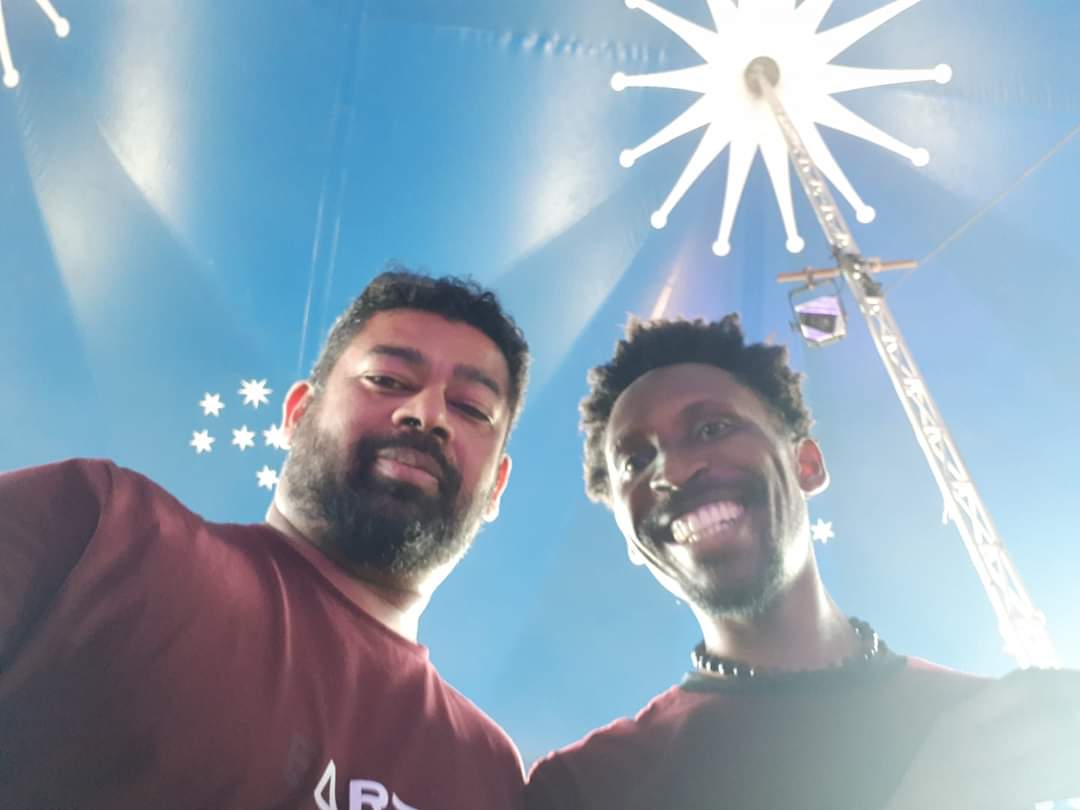Julian Babou & Sonny Troupé
Musicians
February - March 2024

- Music
- Miami
“In the collective imaginary of the European musician, the United States is a beacon of all possibilities, from experimentation to encounters; from convergence to complete artistic explosion!”
We are two Creole artists dedicated to upholding and developing the music of our native lands. Coming respectively from Guadeloupe and Réunion, the essence of our musical history is rooted in colonization and slavery.
However, we have developed an artistic vision that goes far beyond one locally specific style, using funk, hip hop, jazz, and freestyle, and infusing music with our sensibilities, vocabularies, and unique characteristics.
In the past few decades, we have shared the stage with many artists, performing both on the road and in studios. Most of the time when we are asked to play, it is out of a desire to bring our own distinctive voice into the creation.
We are also actively involved in education and cultural outreach, areas that see us working in a variety of settings among diverse publics (from children to incarcerated individuals, people with disabilities, and more).
Early on in our journey, we became aware of the importance of spotlighting the various musical genres of our regions. Steeped in European dancing music and African drumming, the colors and rhythms of our styles have distinctive features both in content and in form, which we feel are essential to bring to light.
Indeed, modern urban and electronic music has its origins in traditional and freestyle music. We are passionate about all these different genres, which we incorporate into our creations when creating both hybrid musical repertoires and other works. Our hope is to get across the idea that our music styles are fueled by encounters and travel right from the moment of writing.
A graduate of the Dante Agostini Drum School, Sonny Troupé has released four albums, and toured and recorded music extensively throughout his career. Some of his collaborations include projects with Christian Laviso, Jacques Schwartz-Bart, Lisa Simone, Kenny Garrett, and Yosuke Onuma. He teaches and hosts a variety of masterclasses.
Julian Babou teaches at the Ecole Music-Halle in Toulouse. He is the founder of Tournefeuille, a Réunionese orchestra of young people with disabilities, and he has taken part in a Creole opera. He also works as a musician for RFO-TV and has recorded with Françoise Guimbert, Magyd Cherfi, and Francis Lassus, among others.
For our residency at Villa Albertine, we want to interact with emigrant artists and groups—or those who have experienced and developed their art and way of life following a geographical shift—in order to understand the underlying challenges, inner workings, and benefits of such an approach. How might their music have changed? How can a way of life be transported across the ocean?
Some fifteen years ago, we formed an afro/jazz/funk instrumental music trio, La Face Cachée des Sous-Bois, that allowed us to distill our influences and ideas, blending, interpreting, and readapting them. We realized that the music initially envisioned in our minds sometimes headed down an unexpected path after contact with our fellow performers. This modus operandi, namely of opening new avenues, emerged as the backbone of our various projects.
We also hope to address and understand the current stakes for Creole populations in light of recently flourishing cultural movements. To this end, we would like to meet with and listen to artists and producers, visit music venues, and swap a few notes. In essence, we want to immerse ourselves in other methods of practice.
The aim is to attempt to provide some answers to the question, “How do we develop our culture outside our homeland, and what does the future hold for Creole music?”
In the collective imaginary of the European musician, the United States is a beacon of all possibilities, from experimentation to encounters; from convergence to complete artistic explosion! As the cradle of jazz (or indeed jazzes) and hip hop, the country is an incredible wellspring of artists whose names are echoed across the globe.
As for us, there is no denying that our careers have often been peppered with sounds from across the Atlantic. We now plan to come and play our own music, bringing it up against these sounds. Very often, these styles had to dare to cross the ocean to be heard in places like Miami, which has now become the essential crossroads of the various musical genres of the world. From jazz to reggaeton, Latin, hip-hop, and electronic, the converging populations from South America and the Caribbean create a dynamic like no other in their representation and fusion of genres. In this sense, Miami appeared as a clear choice for us, being the ideal environment for us to let our music evolve!
In this culturally rich and vibrant setting, an immersion in the artistic world—particularly in the musical spheres—will no doubt prove conducive to meetings and research. We will have an endless choice of music clubs, concerts, and recording studios, where we can take part in one or two sessions and be at the core of the Miami musician ecosystem. We may also find it rewarding to attend a musical rehearsal to understand the links that unite artists in the creation process.
In partnership with

Convivencia
Convivencia is a non-profit organization that defends a local cultural project whose tempo is set by world music and river currents. Its leitmotiv is to encourage exchange and combat prejudice through music and celebration. Rooted in often popular traditions and nourished by current rhythms, styles and repertoires, it fosters intercultural and intergenerational social ties. Convivencia goes against the grain of mainstream events, which often give priority to mainstream artists, and is committed to defending projects with little media coverage that resist the standardization of the music industry.


